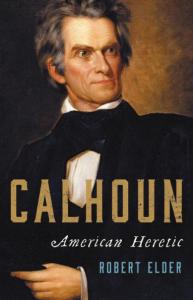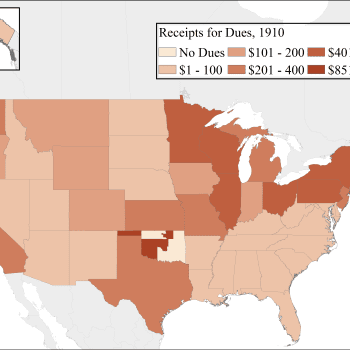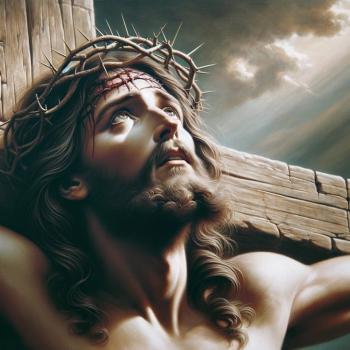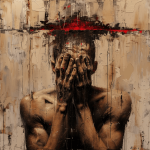How would you like to have a President Trump and a President Biden at the same time? Or perhaps a President DeSantis and a President Newsom?
You probably don’t like the idea, which stems from an end-of-life, cockamamie suggestion from South Carolina’s John C. Calhoun, the vice president, longtime senator, cabinet secretary, and perpetual presidential wannabe. He is the subject of Robert Elder’s penetrating and captivating Calhoun: American Heretic.
 You might be asking: isn’t this a religious history blog? Other than the subtitle, why Calhoun? The South Carolina statesman never warmed to religion, keeping his mother-in-law’s evangelical fervor at the length of his very long arm. An acquaintance claimed that Calhoun repeated Thomas Jefferson’s wholly inaccurate prediction that Unitarianism was the wave of the future. Calhoun was religious indifferent. His only loves were politics, his children, and his plantations, in that order.
You might be asking: isn’t this a religious history blog? Other than the subtitle, why Calhoun? The South Carolina statesman never warmed to religion, keeping his mother-in-law’s evangelical fervor at the length of his very long arm. An acquaintance claimed that Calhoun repeated Thomas Jefferson’s wholly inaccurate prediction that Unitarianism was the wave of the future. Calhoun was religious indifferent. His only loves were politics, his children, and his plantations, in that order.
There are several reasons for contemporary Americans, whatever their politics and religion, to read American Heretic. As Elder contends, Calhoun “belongs at the center of the stories we tell about our past.” Alongside Andrew Jackson, Henry Clay, and Daniel Webster, Calhoun shaped American politics from the 1820s until his death in 1850. It is impossible to understand this era without him.
Moreover, as Elder notes, Calhoun’s ideas have survived him, sometimes in unexpected ways. Calhoun’s signature contribution to American political thought was the “concurrent majority,” that a sectional minority – the South – deserved a veto of some sort over what would otherwise become an untrammeled democratic majority. As the North’s numerical and political clout steadily grew, and as northerners became more hostile to southern slavery, Calhoun desperately sought this veto, through South Carolina’s 1832 attempted nullification of federal tariffs, through furthering white southern unity in the defense of slavery, and through his crazy idea of a dual presidency.
Calhoun’s constitutional arguments, and the debates in which he participated, still have a clear relevance, for the United States in particular but also for democracy more generally. The framers of the American Constitution maintained that an extended republic would preclude or at least mitigate the possibility of a tyrannical majority, and they further guarded against that possibility through a complicated series of checks and balances. Calhoun concluded that all of those protections were insufficient, as the singular issue of slavery led to the formation of two great sectional faction. Almost two centuries later, Americans remain divided over whether checks against popular democracy are a feature or a bug of their constitutional order. Furthermore, as Elder notes, arguments in favor of minority rights look very different if they come from progressives such as Lani Guinier than from slaveholders like John C. Calhoun.
This is an ideas biography, in part because Calhouns loved his own ideas and was dedicated to obtaining the political power necessary to enact them. For me, that points to the captivating nature of this book. Elder does not fall victim to the biographer’s temptation of becoming too sympathetic to his subject. Not at all. He’s fair, and he can write about Calhoun with some compassion, such as when he details his descent toward his consumptive death. But in many respects, this is a warts-and-more-warts treatment. Calhoun ignores his wife, even after she suffers a stroke. He foolishly throws money after a ne’er-do-well son. On occasion, he spares lifelong slaves the worst possible fate, but he separates family members and orders heavy whippings. Calhoun has the audacity to call slavery a positive good even as his own slaves are desperate enough to run away and even try to murder his family.
With Calhoun, one doesn’t have to debate whether the ends justify the means, because the end was singular and terrible. Throughout his long career of switching sides on particular issues and attaching himself to and then discarding political allies, though, Calhoun consistently sought to steer his party and section in whatever direction would most forcefully defend the South’s “peculiar institution.” As Frederick Douglass correctly observed, “Slaveholding has, for years, been the very sun of his political system.” For John C. Calhoun, slavery and white supremacy were the cornerstones of the American republic.

Elder properly notes that Calhoun’s insistence that the United States was the “government of the white man” was “possibly one of the least controversial things he ever said.” True, and his defense of slavery as a positive good was mainstream white opinion in the South by the 1840s. Nevertheless, the gradual focus of Calhoun’s powerful mind and rhetoric on the defense of slavery is the chilling backbone of American Heretic. While approaching the end of Calhoun’s life, Elder comments that for some Americans, Calhoun was “figure of satanic determination and brilliance.” That’s about right, but until quite recently, large numbers of Americans viewed John C. Calhoun, not as a political heretic, but as the principled defender of the Constitution.
In 2020, the city of Charleston removed a statue of Calhoun that had towered over Marion Square for 120 years. A few years ago, Yale wiped Calhoun’s name away from one of its colleges. Good moves. “We do not have to honor John C. Calhoun,” Elder concludes, “nor should we.” But such moves don’t nullify Calhoun’s central role in the emerging sectional crisis of the 1830s and 1840s, or the long shadow he still casts on American democracy.















